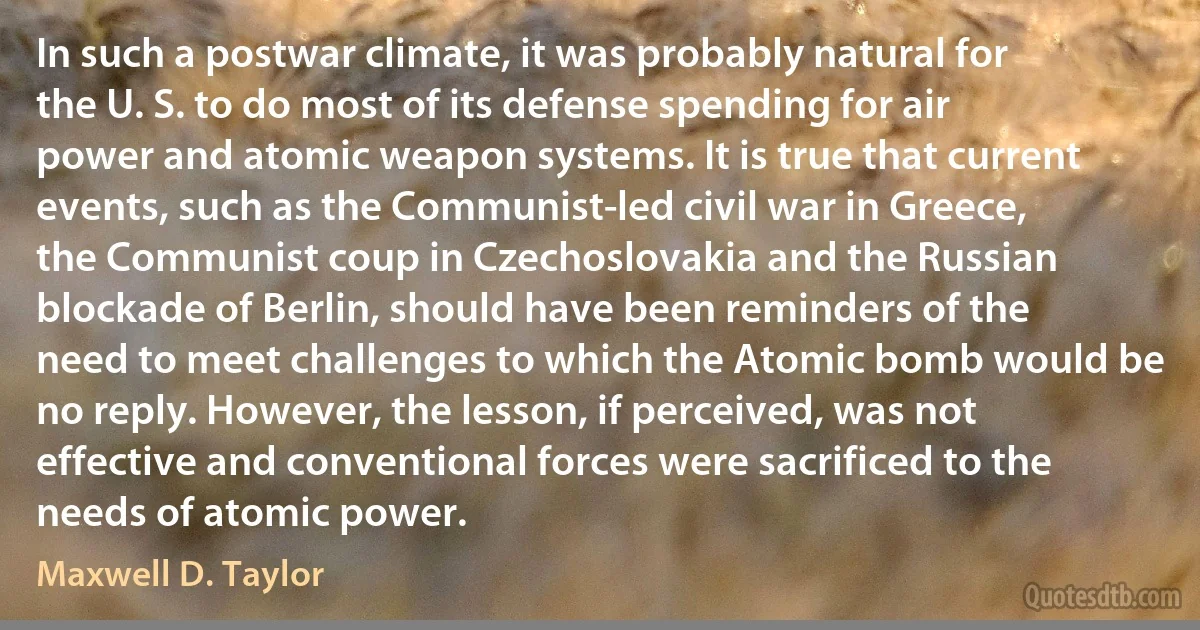Russian Quotes - page 16
.. we parted in 1914, when Kandinsky, being an enemy alien [because of his Russian nationality], had to flee from Germany to Switzerland, as did Jawlensky and Marianne de Werefkin too [to neutral Switzerland]... Ever since we parted in 1914, I have worked mainly by myself. After the First World War, here in Munich, we found that our Blue Rider group had broken up. Franz Marc and Macke had both been killed [in World War 1. ] Kandinsky, Jawlensky and Marianne were no longer here; Bloch and Burliuk were in America. Those of us who were still in Munich remained friends, of course, but each one of us had learned to work by himself rather than in a group. Besides.... we had always been individualists and our Blue Rider group never had a style of its own as uniform as that of the Paris cubists.

Gabriele Munter
The leading Nazis were divided as a rule between the three normal German points of view in regard to external policy. Some wanted an accommodation with France, some wanted to come to terms with Great Britain at the expense of France, and the third and most active group were trying to get an alliance with Soviet Russia against the whole of the West. I knew that [Eric] Koch was the chief advocate of this last policy. He took pains to keep in personal touch with Russian emissaries. He wanted to go to Russia himself. Assuming that I had Hitler's ear on questions of eastern policy, he repeatedly asked me to put forward his ideas in talking to Hitler.

Hermann Rauschning
Having seen the Red Army and Russian diplomacy in action, my own belief is that there is nothing the Soviets would not do to achieve world domination. But I am convinced that also that they respect force; perhaps they respect nothing in the world except force. And when confronted with strength and determination, they stop, look, and listen.

Mark W. Clark
The question of the size of the postwar population of the Soviet Union is not the least of the enigmas which have been baffling students of Russian affairs. Hardly any estimate or evaluation of an economic, sociological or military character for the U. S. S. R. can be made meaningful without an accurate knowledge of the demographic base.

Eugene M. Kulischer
.. I write you from the French front where I'am serving as a soldier in the Russian ambulance Corps. How are you feeling and what are you doing? How are your friends, Lissitsky, Libakov [also former students of Pen], Mazel, Mekler, and Chagall? Please, for God's sake, answer me. I would be so glad to hear how everyone is.
I'm in fine health, but tired of it all – it's utterly disgraceful, makes the soul turn cold. If only it [the war] would just end.
What are you working on, what are you doing? Please write me.

Ossip Zadkine
The Russian economic system is state capitalism, there called state-socialism or even communism, with production directed by a state bureaucracy under the leadership of the Communist Party. The state officials, forming the new ruling class, have the disposal over the product, hence over the surplus-value, whereas the workers receive wages only, thus forming an exploited class.

Antonie Pannekoek
On his neglect of being a rock star: There's a certain discipline about being a rock star, and I don't have it. If I was a rock star, I wouldn't have let a photographer in here, dressed like this. I'd have been down the hairdressers. You try and get Sting to do something without 15 advisors. These boys are like Russian princes...

Chris Rea
Tolstoy becomes intelligible when he is interpreted as a nineteenth century Russian who participates, in the depths of his unconscious soul as well as consciously, in the cultural movements of his time, and in the Russian mystic sense of community with men and nature. It is so with all the members of the radical Christian group. When they meet Christ they do so as heirs of a culture which they cannot reject because it is part of them.

H. Richard Niebuhr
Studying Russian history from the West European perspective, one also becomes conscious of the effect that the absence of feudalism had on Russia. Feudalism had created in the West networks of economic and political institutions that served the central state, once it replaced the feudal system, as a source of social support and relative stability. Russia knew no feudalism in the traditional sense of the word, since, after the emergence of the Muscovite monarchy in the fifteenth and sixteenth centuries, all landowners were tenants-in-chief of the Crown, and subinfeudation was unknown. As a result, all power was concentrated in the Crown.

Richard Pipes
The Empire was traditionally run by a bureaucracy and a gentry, after 1880 reinforced by a political-police organization. This political policing was a Russian invention; Russia was the first country to have two police systems, one to protect the state from its citizens, and the other to protect the citizens from each other. Subsequently, this dual structure became a fundamental feature of totalitarian states.

Richard Pipes
The communist peasant-nationalist regimes of Asia, relying on the Führerprinzip, extreme ethnocentric nationalism, and racism (and the ultimately grotesque in antimodernism in the case of the Cambodia of the Khmer Rouge) seem to some to represent the fascistization of communism. There is no doubt that, as discussed earlier, fascism and communism share many fundamental characteristics, and Russian spokesmen delight in applying the same words to China as to Nazi Germany: ‘petit bourgeois' policy, ‘bourgeois nationalism,' ‘military-bureaucratic degeneration,' ‘subservient obedience' of the masses, ‘anti-intellectualism,' ‘voluntarism,' ‘subjectivism,' ‘autarchic' policies that try to place ‘surplus population' on ‘foreign territories,' concluding that ‘the Maoist approach in no way differs from fascism.

Stanley G. Payne
Some of the similarities and parallels include: Frequent recognition by Hitler and various Nazi leaders (and also Mussolini) that their only revolutionary and ideological counterparts were to be found in the Soviet Union... [and the] espousal of the have-not, proletarian-nation theory, which Lenin adopted only after it had been introduce in Italy... Hitlerian National Socialism more nearly paralleled Russian communism than has any other non-Communist system.

Stanley G. Payne
I am particularly concerned about the recent allegations of mass persecutions of LGBTI people in the Chechen Republic of the Russian Federation. Discrimination and violence against LGBTI people is the worst kind of populism. Using minorities as scapegoats is unfortunately a growing trend. It is dangerous to democracy and governments must do all they can to stop it.

Thorbjørn Jagland
![[JawlenskyPickWerefkin] Yes, we [ Marianne Werefkin and Gabriéle] shared very much the same tastes and ideas, when we lived together in this house (the so-called 'Russian house' in Murnau]. She was extremely perceptive and intelligent, but Jawlensky [living with Marianne Werefkin] didn't always approve her work... Suddenly Jawlensky would pick on some tiny detail of one of Marianne's best and most original pictures and exclaim: 'That patch of color, there, is laid on much too flat and smoothly. It's just like old Riepin' [famous Russian painter Ilya Repin ] and their common former teacher in Russia]. Of course it was nonsense and he was only saying it to annoy her. But Jawlensky really was a devotee of the 'touche de peinture' of the French Fauvists, rather than an innovator, a believer in a new kind of art of the future. (Gabriele Munter)](https://cdn.quotesdtb.com/img/quotes_images_webp/07/gabriele-munter-annoy-art-850007.webp)


